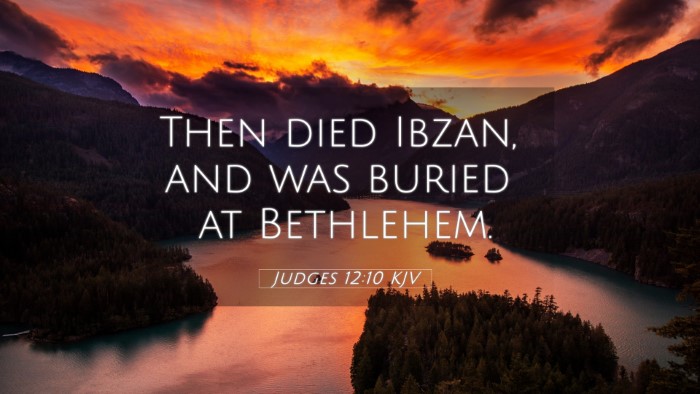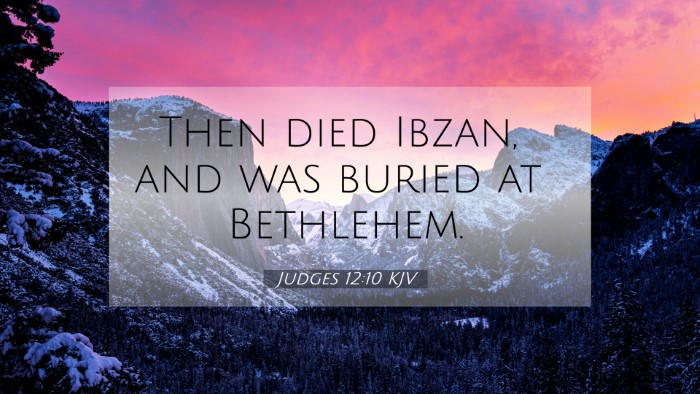Old Testament
Genesis Exodus Leviticus Numbers Deuteronomy Joshua Judges Ruth 1 Samuel 2 Samuel 1 Kings 2 Kings 1 Chronicles 2 Chronicles Ezra Nehemiah Esther Job Psalms Proverbs Ecclesiastes Song of Solomon Isaiah Jeremiah Lamentations Ezekiel Daniel Hosea Joel Amos Obadiah Jonah Micah Nahum Habakkuk Zephaniah Haggai Zechariah MalachiJudges 12:10 Similar Verses
Judges 12:10 Cross References
Then died Ibzan, and was buried at Bethlehem.
Uncover the Rich Themes and Topics of This Bible Verse
Listed below are the Bible themes associated with Judges 12:10. We invite you to explore each theme to gain deeper insights into the Scriptures.
Judges 12:10 Cross Reference Verses
No cross reference images were found in our system for this Bible passage.
Judges 12:10 Verse Analysis and Similar Verses
Understanding Judges 12:10
Judges 12:10 records a poignant moment in the narrative of the judges of Israel, specifically the transition during the leadership of Jephthah. This verse captures the essence of leadership, accountability, and the challenges faced by those in positions of authority. By examining the interpretations offered by Matthew Henry, Albert Barnes, and Adam Clarke, we can delve deeper into its meaning and implications.
Verse Context
The verse states: "And Jephthah judged Israel six years. And Jephthah the Gileadite died, and was buried in one of the cities of Gilead." This conclusion of Jephthah's judgeship aligns with the cyclical nature of Israel's history during this period—each judge rises and falls, reflecting the ongoing struggle of the Israelites with faithfulness to God amidst external and internal challenges.
Commentary Insights
Matthew Henry
Matthew Henry noted that Jephthah's leadership, characterized by his military prowess, ultimately culminated in his death. He emphasized that even strong leaders must face mortality and that their legacies are remembered through their actions. The focus here is on the stewardship of leadership; Jephthah's success in battle should not overshadow the need for righteous living.
Albert Barnes
According to Albert Barnes, the mention of Jephthah’s death serves a dual purpose. First, it reflects the transient nature of human leadership, showcasing how even the mightiest can fall. Secondly, it connects with the ongoing history of the Israelites—implying that their leadership is vital for their relational fidelity to God. Barnes encourages readers to view the judges not simply as leaders but as reflections of God's guidance in an errant nation.
Adam Clarke
Adam Clarke elaborated further on the outcomes of Jephthah’s leadership, noting the consequences of his vow and its tragic impact on his household. Clarke posited that Jephthah’s life serves both as an inspiration and a warning—a reminder of the heavy burdens borne by those who lead and the spiritual ramifications of their actions. Clarke also draws connections to other biblical figures who faced similar trials, enriching the reader's understanding of the broader biblical narrative.
Bible Verse Cross-References
- Judges 11:29-40: Jephthah's vow and its implications.
- Hebrews 11:32-34: Jephthah's mention among the heroes of faith.
- 1 Samuel 12:11: A reference to the leadership of various judges in Israel.
- Luke 7:28: The acknowledgment of the greatness of John the Baptist and comparisons to other prophetic figures.
- James 5:17: The nature of the prayer of the righteous, exemplified by figures like Elijah, reflecting the thematic connections of leadership and prayer.
- Romans 15:4: The importance of scriptures for instruction and hope, linking to Jephthah's story as a moral lesson.
- 2 Chronicles 19:4-7: How leaders should govern with righteousness, connecting with Jephthah's legacy.
Connections Between Bible Verses
The advantages of cross-referencing biblical texts such as Judges 12:10 are profound. By linking various scriptures, readers can observe thematic connections and the broader narrative of faithfulness, leadership, and divine sovereignty throughout the Bible.
Purpose of Cross-Referencing
Cross-referencing not only enriches the understanding of a singular verse but unveils a web of inter-Biblical dialogue. Tools like Bible concordances and cross-reference guides facilitate the exploration of similar themes, enabling a comparative Bible verse analysis that reveals deeper insights into God's workings through both the Old and New Testaments.
Bible Verse Parallels
When performing a comparative analysis of Biblical texts, we see parallels between judges like Jephthah and other biblical figures who navigate faith and ethical dilemmas. This approach allows for a dynamic interpretation of scripture, where one can ask how each passage informs the understanding of leadership and accountability.
Tools for Bible Cross-Referencing
- Utilizing a Bible concordance for in-depth study.
- Engaging with a Bible cross-reference guide for contextual insights.
- Exploring Bible chain references to trace themes.
- Implementing comprehensive Bible cross-reference materials for scholarly research.
Final Reflections
The lessons gleaned from Judges 12:10 resonate through ages. By acknowledging the need for righteousness, understanding the complexities of leadership, and engaging with scripture through thoughtful cross-referencing, believers can not only enrich their spiritual journey but also foster a deeper connection with the divine narrative presented in the Bible.
How to Find Cross-References in the Bible
Engaging with the Bible for cross-references involves an intentional approach. Readers can begin by identifying key themes or specific phrases within a verse. This leads to exploring various translations and utilizing digital or printed Bible reference resources designed for cross-referencing.
Conclusion
In summary, Judges 12:10 serves as a pivotal reminder of the gravity of leadership and the transient nature of human authority contrasted with God's eternal sovereignty. Through the lenses of prominent commentaries, inter-Biblical dialogue can be established, enriching our understanding of this pivotal verse in relation to others.


